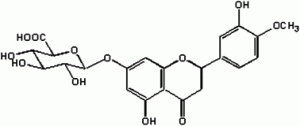 A study recently published in Food & Function from Advisory Board member Junji Terao and co-workers in Japan shows that water-dispersible hesperetin, an aglycone of citrus flavonoids, is effectively accumulated in human plasma and works as a vasodilator through its metabolites. The study concludes that hesperetin is a promising flavonoid as a component of functional foods and can be expected to help in maintaining vascular health.
A study recently published in Food & Function from Advisory Board member Junji Terao and co-workers in Japan shows that water-dispersible hesperetin, an aglycone of citrus flavonoids, is effectively accumulated in human plasma and works as a vasodilator through its metabolites. The study concludes that hesperetin is a promising flavonoid as a component of functional foods and can be expected to help in maintaining vascular health.
Hesperetin is the aglycone of hesperidin which is present in citrus fruits and has been implicated in many of their beneficial effects including vascular protection; hesperetin has better bioavailability than hesperidin. Previous work implies that elevation of water solubility results in even higher bioavailability of hesperetin, which has low aqueous solubility due to its hydrophobic flavanone structure. Therefore, in this study micronized water-diseprsable hesperetin was developed and its bioavailability and effects on vasodilation-related functions tested in vitro and in vivo.
Water-dispersible hesperetin, as compared to intact hesperetin, was absorbed into the blood rapidly and at high concentrations. LC-MS analysis identified a range of metabolites and one, Hp7GA was shown, in cultured endothelial cells, to enhance NO release by inhibiting NADPH oxidase activity. Furthermore, a volunteer study using women with cold sensitivity showed that a single dose was effective on peripheral vasodilation. The results of this study suggest that hesperetin is able to exert potential vasodilation effects by the endothelial action of its plasma metabolites.
Interested in knowing more? Read the full article for free until March 9th.
Bioavailability of orally administered water-dispersible hesperetin and its effect on peripheral vasodilatation in human subjects: implication of endothelial functions of plasma conjugated metabolites
Hiroko Takumi, Hiroyasu Nakamura, Terumi Simizu, Ryoko Harada, Takashi Kometani, Tomonori Nadamoto, Rie Mukai, Kaeko Murota, Yoshichika Kawai and Junji Terao
Food Funct., 2012, Advance Article, DOI: 10.1039/C2FO10224B
You may also be interested in this review from Professor Terao which is free to access.
Conjugated quercetin glucuronides as bioactive metabolites and precursors of aglycone in vivo
Junji Terao, Kaeko Murota and Yoshichika Kawai
Food Funct., 2011, 2, 11-17, DOI: 10.1039/C0FO00106F
You can keep up to date with the latest developments from Food & Function by signing up for free table of contents alerts and monthly e-newsletters.










